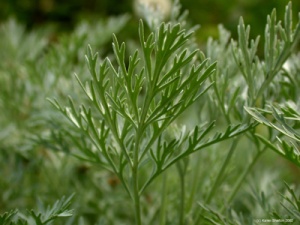Artemisia absinthium
| See Also | Botanical Monographs |
|---|
Wormwood (Artemisia absinthium) is best known as a de-wormer for parasitic infections due to its antihelmintic properties. It is also a very strong bitter and can be used to aid digestion and to support the immune system. Long-term use can be toxic, so it must be used with caution. To explore the characteristics, medicinal uses and prescribing considerations of this herb in more detail, check out the references indicated.[1], [2]
Contents
Characteristics
- Common Names: Wormwood, Absinthe, Green ginger
- Family: Compositae/Asteraceae
- Habitat: Artemisia absinthium is native to Europe, northern Africa, but is also found in the eastern U.S.A. and central Asia where it is found in gardens and on waste ground, especially near oceans.
- Parts Used: Aerial parts
- Constituents: volatile oils (sesquiterpene lactones - bitter principle, monoterpenes, thujone, azulenes), flavonoids, phenolic acids, lignans, resins
- Medicinal Actions: bitter (detectable at 1:30,000 dilution), vermifuge, febrifuge, nervine, carminative, tonic, antidepressant (mild), emmenagogue, stimulant, antihelmintic, antimicrobial, antiparasitic, antipyretic, hepatic
Uses
Historical Uses:
Dioscorides mentions Artemisia absinthium as a vermifuge or de-wormer. It has been used as a vermifuge and bitter for indigestion, fever, infection, as an antidepressant and an insecticide due to the sesquiterpene lactones. Absinthe and vermouth (meaning "wormwood" in German) both take their names from this plant.
Medicinal Uses:
- used for parasitic infections
- can help strengthen the immune system when treating colds and flus
- Other Conditions
- used to treat a number of conditions that arise due to malabsorption including anemia, biliary dyskinesia, fevers and depression.
Prescribing Considerations
If using the herb for worms, the pill form of the powdered herb may be preferred due to the extreme bitterness. If using it as a digestive aid, the bitterness must be tasted in order to be effective.
The information provided is intended to augment the treatment from a naturopathic doctor or other trained medical professional. Although most herbs are generally safe, it is recommended that you avoid self-prescribing especially when there is an underlying ongoing medical condition, if you are on any prescription medications or if you are pregnant or breastfeeding.
Formulations and Preparation
Safety
The safety and prescribing considerations for this herb include:[3], [4]
- Generally regarded as safe.
- Side-effects are primarily due to thujone and are generally only likely with overdose. Extended use, especially of alcohol extracts, may lead to increased risk of convulsions, paralysis, unconsciousness, or even death. Allergic reactions may also occur (common to the Asteraceae family, acts as an irritant especially when fresh). It may also cause gastrointestinal irritation. The aqueous extracts are non toxic.
- Contrindications: pregnancy (emmenagogue and abortifacient, empirical), gastrointestinal ulcers (empirical), hyperchlorhydria (increased acid production); prolonged use of forms high in thujone can lead to CNS toxicity.
- Drug-Herb Interactions.[2]
- H2-Secreting Antagonists or Other Antacids - Artemisia absinthium is a stomach-acid secreting stimulant and therefore can act as an antagonist to the drug.
References
- ↑ Boon Heather, Smith Michael (2009) 55 Most Common Medicinal Herbs: The Complete Natural Medicine Guide Second Edition Institute of Naturopathic Education and Research, CCNM Toronto.
- ↑ 2.0 2.1 Godfrey Anthony, Saunders Paul, Barlow Kerry, Gowan Matt (2011) Principles and Practices of Naturopathic Botanical Medicine, Advanced Botanical Medicine. V3 CCNM Press, Toronto.
- ↑ Stargrove Mitchell Bebell, Treasure Jonathan, McKee Dwight L (2008) Herb, Nutrient and Drug Interactions: Clinical Implications and Therapeutic Strategies
- ↑ Brinker Francis (1997) Herbal Contraindications and Drug Interactions: Plus Herbal Adjuncts With Medicines, 4th Edition Eclectic Medical Publications.
